NURSING: Patient Participation & NMC Standard 2.2 in Healthcare
VerifiedAdded on 2022/11/25
|11
|3125
|327
Essay
AI Summary
This essay examines the critical role of nurses in promoting patient engagement and active participation in healthcare, focusing on the NMC Code standard 2.2, which emphasizes recognizing and respecting patients' contributions to their health and wellbeing. The essay delves into various strategies nurses employ to facilitate patient involvement in decision-making, disease management, and self-care, particularly within the context of adult nursing. It critically analyzes the benefits of patient engagement, such as improved patient outcomes, enhanced health literacy, and reduced medical errors. The discussion encompasses barriers to patient participation, including poor communication and lack of patient-centered care, and explores assessment tools and personalized interventions to overcome these challenges. The essay highlights the importance of communication, trustful relationships, and cultural sensitivity in fostering effective nurse-patient partnerships, ultimately emphasizing the positive impact of patient empowerment on healthcare quality and patient safety. The essay concludes by emphasizing the importance of nurses in eliminating health disparities and improving health outcomes through active patient participation.
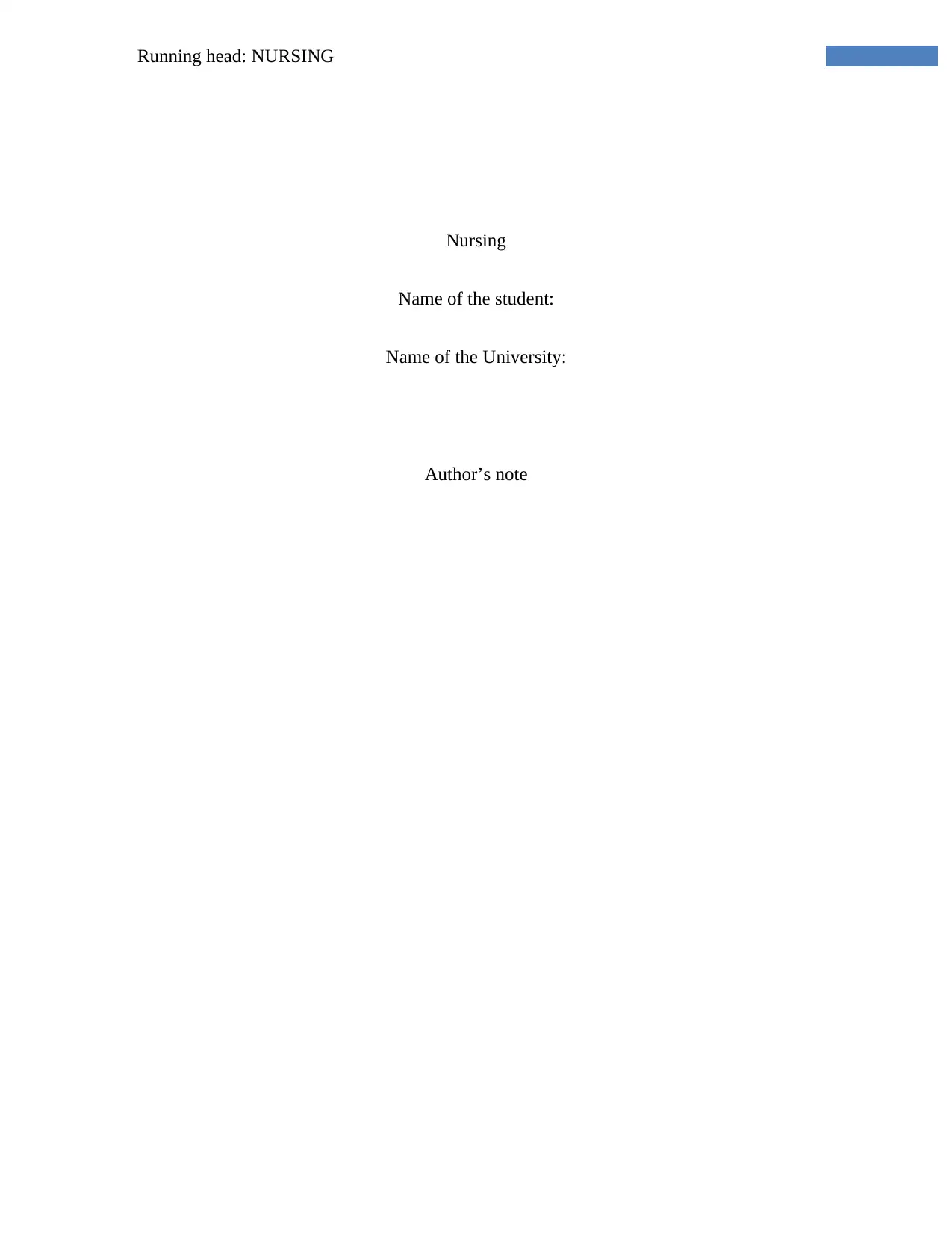
Running head: NURSING
Nursing
Name of the student:
Name of the University:
Author’s note
Nursing
Name of the student:
Name of the University:
Author’s note
Paraphrase This Document
Need a fresh take? Get an instant paraphrase of this document with our AI Paraphraser
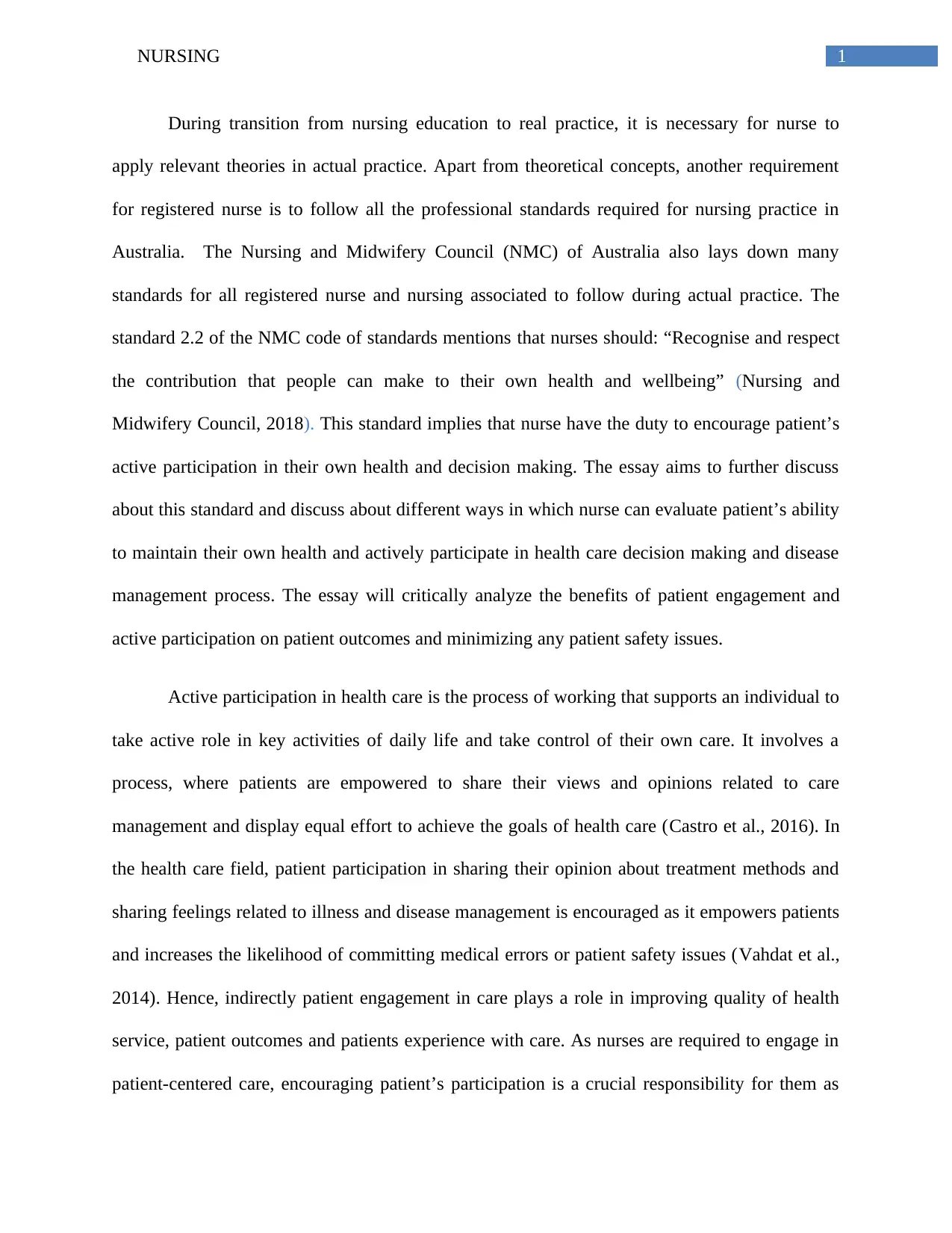
1NURSING
During transition from nursing education to real practice, it is necessary for nurse to
apply relevant theories in actual practice. Apart from theoretical concepts, another requirement
for registered nurse is to follow all the professional standards required for nursing practice in
Australia. The Nursing and Midwifery Council (NMC) of Australia also lays down many
standards for all registered nurse and nursing associated to follow during actual practice. The
standard 2.2 of the NMC code of standards mentions that nurses should: “Recognise and respect
the contribution that people can make to their own health and wellbeing” (Nursing and
Midwifery Council, 2018). This standard implies that nurse have the duty to encourage patient’s
active participation in their own health and decision making. The essay aims to further discuss
about this standard and discuss about different ways in which nurse can evaluate patient’s ability
to maintain their own health and actively participate in health care decision making and disease
management process. The essay will critically analyze the benefits of patient engagement and
active participation on patient outcomes and minimizing any patient safety issues.
Active participation in health care is the process of working that supports an individual to
take active role in key activities of daily life and take control of their own care. It involves a
process, where patients are empowered to share their views and opinions related to care
management and display equal effort to achieve the goals of health care (Castro et al., 2016). In
the health care field, patient participation in sharing their opinion about treatment methods and
sharing feelings related to illness and disease management is encouraged as it empowers patients
and increases the likelihood of committing medical errors or patient safety issues (Vahdat et al.,
2014). Hence, indirectly patient engagement in care plays a role in improving quality of health
service, patient outcomes and patients experience with care. As nurses are required to engage in
patient-centered care, encouraging patient’s participation is a crucial responsibility for them as
During transition from nursing education to real practice, it is necessary for nurse to
apply relevant theories in actual practice. Apart from theoretical concepts, another requirement
for registered nurse is to follow all the professional standards required for nursing practice in
Australia. The Nursing and Midwifery Council (NMC) of Australia also lays down many
standards for all registered nurse and nursing associated to follow during actual practice. The
standard 2.2 of the NMC code of standards mentions that nurses should: “Recognise and respect
the contribution that people can make to their own health and wellbeing” (Nursing and
Midwifery Council, 2018). This standard implies that nurse have the duty to encourage patient’s
active participation in their own health and decision making. The essay aims to further discuss
about this standard and discuss about different ways in which nurse can evaluate patient’s ability
to maintain their own health and actively participate in health care decision making and disease
management process. The essay will critically analyze the benefits of patient engagement and
active participation on patient outcomes and minimizing any patient safety issues.
Active participation in health care is the process of working that supports an individual to
take active role in key activities of daily life and take control of their own care. It involves a
process, where patients are empowered to share their views and opinions related to care
management and display equal effort to achieve the goals of health care (Castro et al., 2016). In
the health care field, patient participation in sharing their opinion about treatment methods and
sharing feelings related to illness and disease management is encouraged as it empowers patients
and increases the likelihood of committing medical errors or patient safety issues (Vahdat et al.,
2014). Hence, indirectly patient engagement in care plays a role in improving quality of health
service, patient outcomes and patients experience with care. As nurses are required to engage in
patient-centered care, encouraging patient’s participation is a crucial responsibility for them as
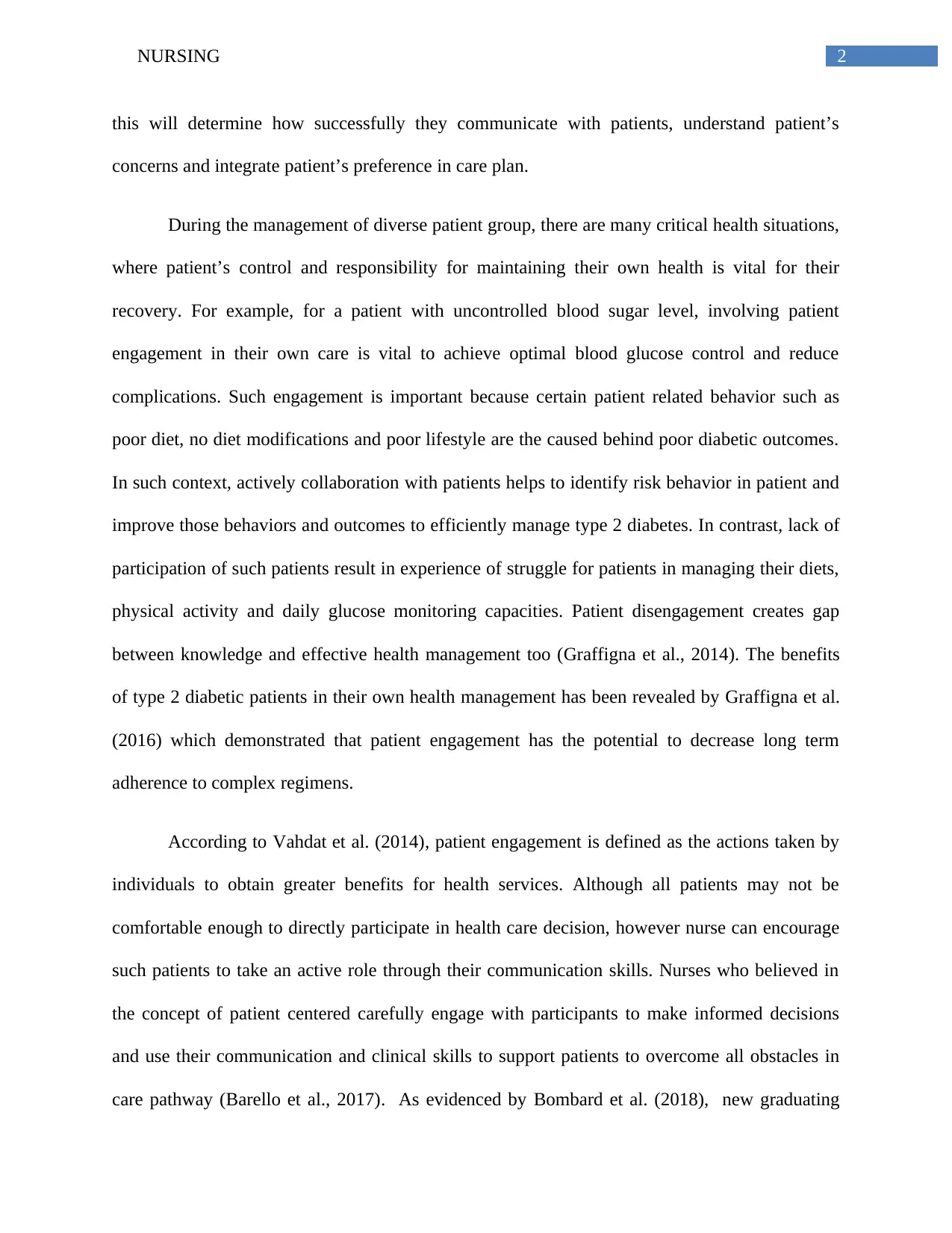
2NURSING
this will determine how successfully they communicate with patients, understand patient’s
concerns and integrate patient’s preference in care plan.
During the management of diverse patient group, there are many critical health situations,
where patient’s control and responsibility for maintaining their own health is vital for their
recovery. For example, for a patient with uncontrolled blood sugar level, involving patient
engagement in their own care is vital to achieve optimal blood glucose control and reduce
complications. Such engagement is important because certain patient related behavior such as
poor diet, no diet modifications and poor lifestyle are the caused behind poor diabetic outcomes.
In such context, actively collaboration with patients helps to identify risk behavior in patient and
improve those behaviors and outcomes to efficiently manage type 2 diabetes. In contrast, lack of
participation of such patients result in experience of struggle for patients in managing their diets,
physical activity and daily glucose monitoring capacities. Patient disengagement creates gap
between knowledge and effective health management too (Graffigna et al., 2014). The benefits
of type 2 diabetic patients in their own health management has been revealed by Graffigna et al.
(2016) which demonstrated that patient engagement has the potential to decrease long term
adherence to complex regimens.
According to Vahdat et al. (2014), patient engagement is defined as the actions taken by
individuals to obtain greater benefits for health services. Although all patients may not be
comfortable enough to directly participate in health care decision, however nurse can encourage
such patients to take an active role through their communication skills. Nurses who believed in
the concept of patient centered carefully engage with participants to make informed decisions
and use their communication and clinical skills to support patients to overcome all obstacles in
care pathway (Barello et al., 2017). As evidenced by Bombard et al. (2018), new graduating
this will determine how successfully they communicate with patients, understand patient’s
concerns and integrate patient’s preference in care plan.
During the management of diverse patient group, there are many critical health situations,
where patient’s control and responsibility for maintaining their own health is vital for their
recovery. For example, for a patient with uncontrolled blood sugar level, involving patient
engagement in their own care is vital to achieve optimal blood glucose control and reduce
complications. Such engagement is important because certain patient related behavior such as
poor diet, no diet modifications and poor lifestyle are the caused behind poor diabetic outcomes.
In such context, actively collaboration with patients helps to identify risk behavior in patient and
improve those behaviors and outcomes to efficiently manage type 2 diabetes. In contrast, lack of
participation of such patients result in experience of struggle for patients in managing their diets,
physical activity and daily glucose monitoring capacities. Patient disengagement creates gap
between knowledge and effective health management too (Graffigna et al., 2014). The benefits
of type 2 diabetic patients in their own health management has been revealed by Graffigna et al.
(2016) which demonstrated that patient engagement has the potential to decrease long term
adherence to complex regimens.
According to Vahdat et al. (2014), patient engagement is defined as the actions taken by
individuals to obtain greater benefits for health services. Although all patients may not be
comfortable enough to directly participate in health care decision, however nurse can encourage
such patients to take an active role through their communication skills. Nurses who believed in
the concept of patient centered carefully engage with participants to make informed decisions
and use their communication and clinical skills to support patients to overcome all obstacles in
care pathway (Barello et al., 2017). As evidenced by Bombard et al. (2018), new graduating
⊘ This is a preview!⊘
Do you want full access?
Subscribe today to unlock all pages.

Trusted by 1+ million students worldwide
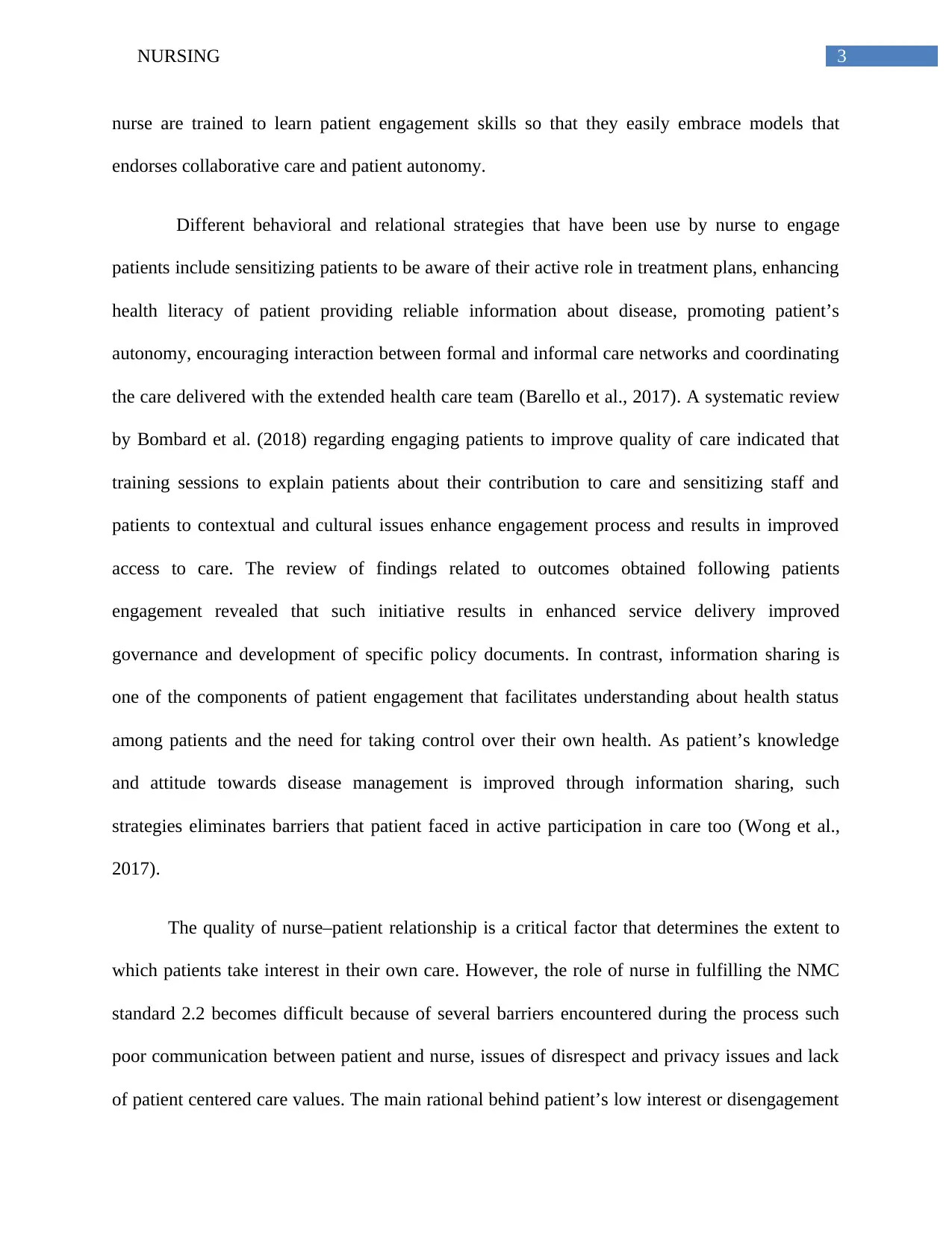
3NURSING
nurse are trained to learn patient engagement skills so that they easily embrace models that
endorses collaborative care and patient autonomy.
Different behavioral and relational strategies that have been use by nurse to engage
patients include sensitizing patients to be aware of their active role in treatment plans, enhancing
health literacy of patient providing reliable information about disease, promoting patient’s
autonomy, encouraging interaction between formal and informal care networks and coordinating
the care delivered with the extended health care team (Barello et al., 2017). A systematic review
by Bombard et al. (2018) regarding engaging patients to improve quality of care indicated that
training sessions to explain patients about their contribution to care and sensitizing staff and
patients to contextual and cultural issues enhance engagement process and results in improved
access to care. The review of findings related to outcomes obtained following patients
engagement revealed that such initiative results in enhanced service delivery improved
governance and development of specific policy documents. In contrast, information sharing is
one of the components of patient engagement that facilitates understanding about health status
among patients and the need for taking control over their own health. As patient’s knowledge
and attitude towards disease management is improved through information sharing, such
strategies eliminates barriers that patient faced in active participation in care too (Wong et al.,
2017).
The quality of nurse–patient relationship is a critical factor that determines the extent to
which patients take interest in their own care. However, the role of nurse in fulfilling the NMC
standard 2.2 becomes difficult because of several barriers encountered during the process such
poor communication between patient and nurse, issues of disrespect and privacy issues and lack
of patient centered care values. The main rational behind patient’s low interest or disengagement
nurse are trained to learn patient engagement skills so that they easily embrace models that
endorses collaborative care and patient autonomy.
Different behavioral and relational strategies that have been use by nurse to engage
patients include sensitizing patients to be aware of their active role in treatment plans, enhancing
health literacy of patient providing reliable information about disease, promoting patient’s
autonomy, encouraging interaction between formal and informal care networks and coordinating
the care delivered with the extended health care team (Barello et al., 2017). A systematic review
by Bombard et al. (2018) regarding engaging patients to improve quality of care indicated that
training sessions to explain patients about their contribution to care and sensitizing staff and
patients to contextual and cultural issues enhance engagement process and results in improved
access to care. The review of findings related to outcomes obtained following patients
engagement revealed that such initiative results in enhanced service delivery improved
governance and development of specific policy documents. In contrast, information sharing is
one of the components of patient engagement that facilitates understanding about health status
among patients and the need for taking control over their own health. As patient’s knowledge
and attitude towards disease management is improved through information sharing, such
strategies eliminates barriers that patient faced in active participation in care too (Wong et al.,
2017).
The quality of nurse–patient relationship is a critical factor that determines the extent to
which patients take interest in their own care. However, the role of nurse in fulfilling the NMC
standard 2.2 becomes difficult because of several barriers encountered during the process such
poor communication between patient and nurse, issues of disrespect and privacy issues and lack
of patient centered care values. The main rational behind patient’s low interest or disengagement
Paraphrase This Document
Need a fresh take? Get an instant paraphrase of this document with our AI Paraphraser
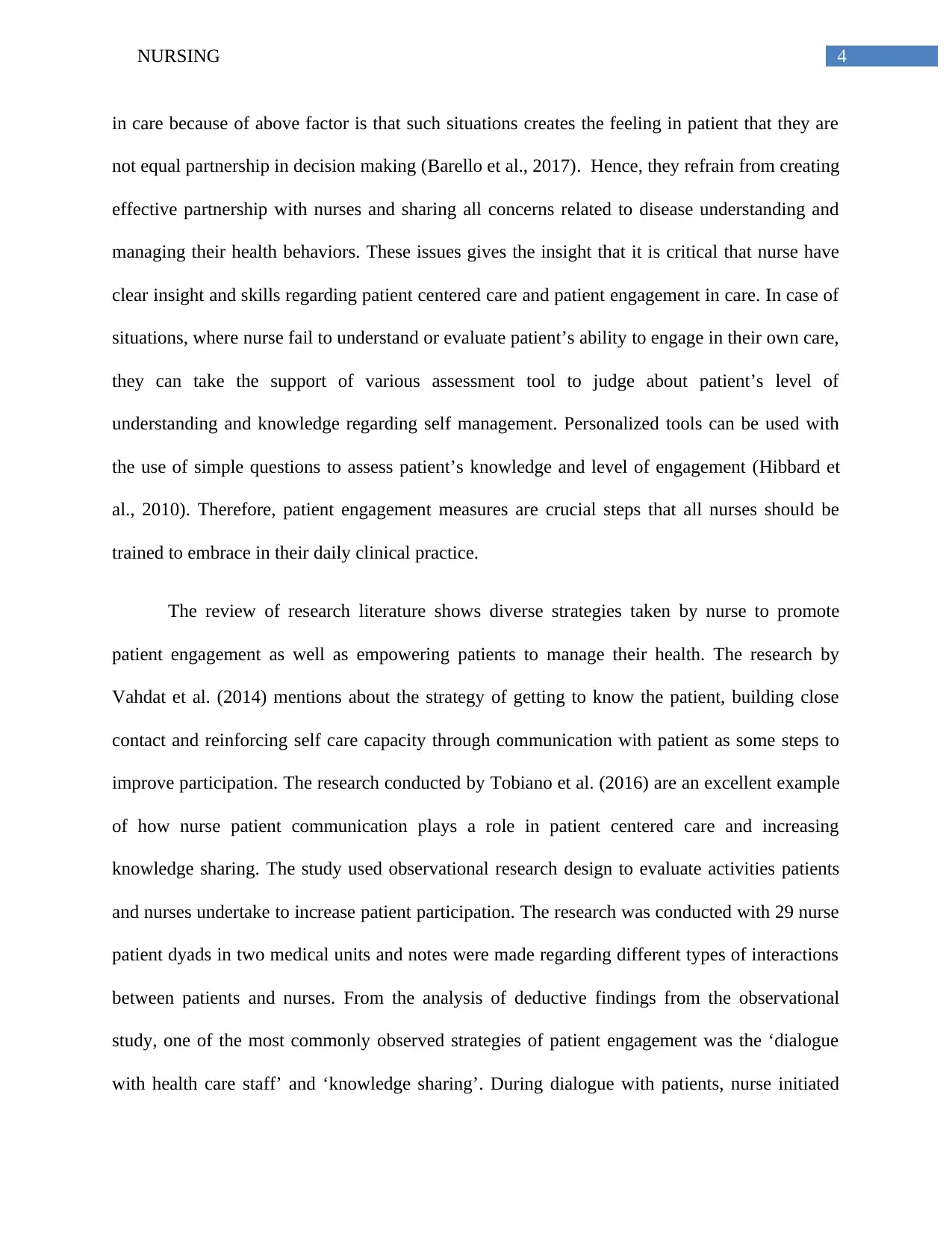
4NURSING
in care because of above factor is that such situations creates the feeling in patient that they are
not equal partnership in decision making (Barello et al., 2017). Hence, they refrain from creating
effective partnership with nurses and sharing all concerns related to disease understanding and
managing their health behaviors. These issues gives the insight that it is critical that nurse have
clear insight and skills regarding patient centered care and patient engagement in care. In case of
situations, where nurse fail to understand or evaluate patient’s ability to engage in their own care,
they can take the support of various assessment tool to judge about patient’s level of
understanding and knowledge regarding self management. Personalized tools can be used with
the use of simple questions to assess patient’s knowledge and level of engagement (Hibbard et
al., 2010). Therefore, patient engagement measures are crucial steps that all nurses should be
trained to embrace in their daily clinical practice.
The review of research literature shows diverse strategies taken by nurse to promote
patient engagement as well as empowering patients to manage their health. The research by
Vahdat et al. (2014) mentions about the strategy of getting to know the patient, building close
contact and reinforcing self care capacity through communication with patient as some steps to
improve participation. The research conducted by Tobiano et al. (2016) are an excellent example
of how nurse patient communication plays a role in patient centered care and increasing
knowledge sharing. The study used observational research design to evaluate activities patients
and nurses undertake to increase patient participation. The research was conducted with 29 nurse
patient dyads in two medical units and notes were made regarding different types of interactions
between patients and nurses. From the analysis of deductive findings from the observational
study, one of the most commonly observed strategies of patient engagement was the ‘dialogue
with health care staff’ and ‘knowledge sharing’. During dialogue with patients, nurse initiated
in care because of above factor is that such situations creates the feeling in patient that they are
not equal partnership in decision making (Barello et al., 2017). Hence, they refrain from creating
effective partnership with nurses and sharing all concerns related to disease understanding and
managing their health behaviors. These issues gives the insight that it is critical that nurse have
clear insight and skills regarding patient centered care and patient engagement in care. In case of
situations, where nurse fail to understand or evaluate patient’s ability to engage in their own care,
they can take the support of various assessment tool to judge about patient’s level of
understanding and knowledge regarding self management. Personalized tools can be used with
the use of simple questions to assess patient’s knowledge and level of engagement (Hibbard et
al., 2010). Therefore, patient engagement measures are crucial steps that all nurses should be
trained to embrace in their daily clinical practice.
The review of research literature shows diverse strategies taken by nurse to promote
patient engagement as well as empowering patients to manage their health. The research by
Vahdat et al. (2014) mentions about the strategy of getting to know the patient, building close
contact and reinforcing self care capacity through communication with patient as some steps to
improve participation. The research conducted by Tobiano et al. (2016) are an excellent example
of how nurse patient communication plays a role in patient centered care and increasing
knowledge sharing. The study used observational research design to evaluate activities patients
and nurses undertake to increase patient participation. The research was conducted with 29 nurse
patient dyads in two medical units and notes were made regarding different types of interactions
between patients and nurses. From the analysis of deductive findings from the observational
study, one of the most commonly observed strategies of patient engagement was the ‘dialogue
with health care staff’ and ‘knowledge sharing’. During dialogue with patients, nurse initiated
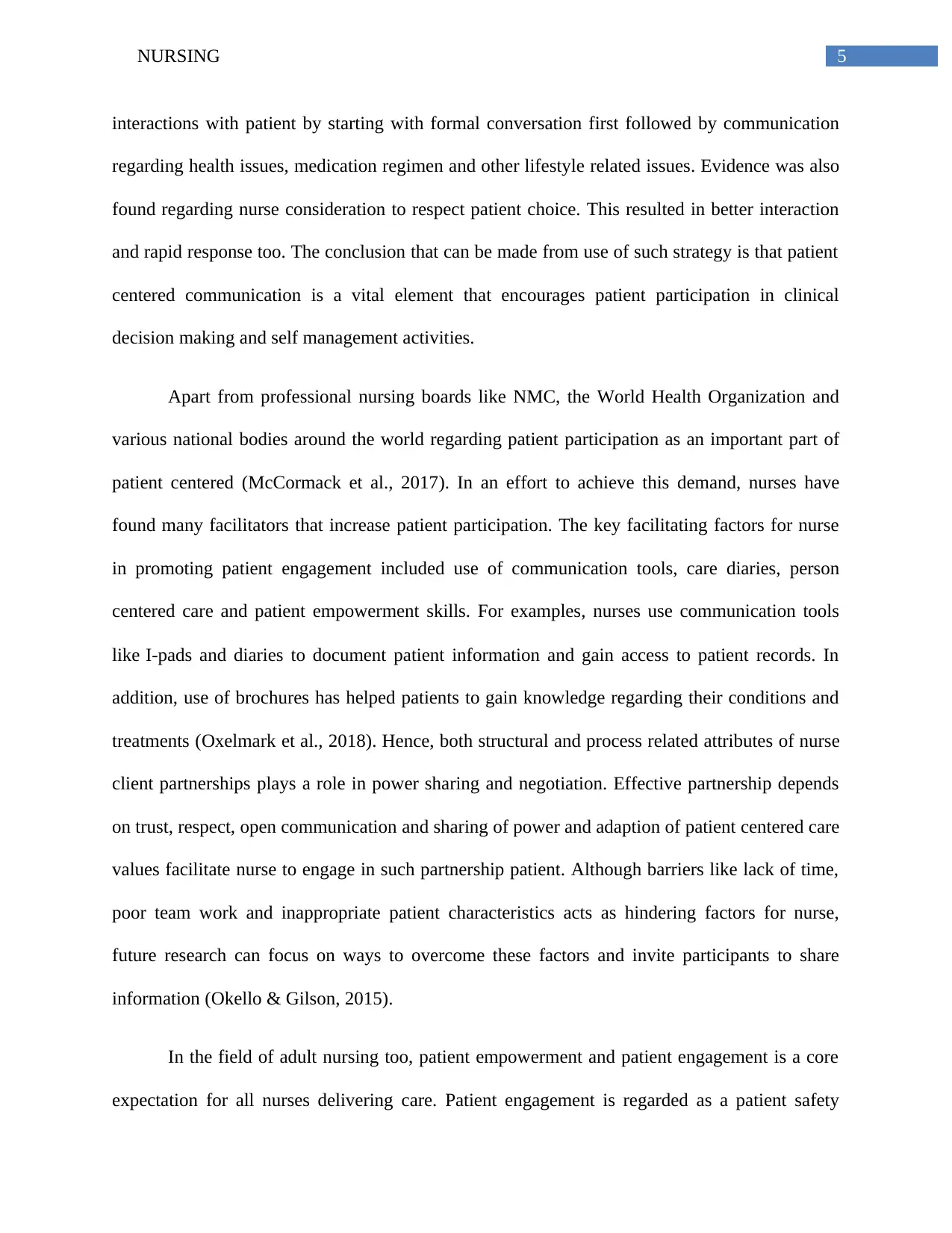
5NURSING
interactions with patient by starting with formal conversation first followed by communication
regarding health issues, medication regimen and other lifestyle related issues. Evidence was also
found regarding nurse consideration to respect patient choice. This resulted in better interaction
and rapid response too. The conclusion that can be made from use of such strategy is that patient
centered communication is a vital element that encourages patient participation in clinical
decision making and self management activities.
Apart from professional nursing boards like NMC, the World Health Organization and
various national bodies around the world regarding patient participation as an important part of
patient centered (McCormack et al., 2017). In an effort to achieve this demand, nurses have
found many facilitators that increase patient participation. The key facilitating factors for nurse
in promoting patient engagement included use of communication tools, care diaries, person
centered care and patient empowerment skills. For examples, nurses use communication tools
like I‐pads and diaries to document patient information and gain access to patient records. In
addition, use of brochures has helped patients to gain knowledge regarding their conditions and
treatments (Oxelmark et al., 2018). Hence, both structural and process related attributes of nurse
client partnerships plays a role in power sharing and negotiation. Effective partnership depends
on trust, respect, open communication and sharing of power and adaption of patient centered care
values facilitate nurse to engage in such partnership patient. Although barriers like lack of time,
poor team work and inappropriate patient characteristics acts as hindering factors for nurse,
future research can focus on ways to overcome these factors and invite participants to share
information (Okello & Gilson, 2015).
In the field of adult nursing too, patient empowerment and patient engagement is a core
expectation for all nurses delivering care. Patient engagement is regarded as a patient safety
interactions with patient by starting with formal conversation first followed by communication
regarding health issues, medication regimen and other lifestyle related issues. Evidence was also
found regarding nurse consideration to respect patient choice. This resulted in better interaction
and rapid response too. The conclusion that can be made from use of such strategy is that patient
centered communication is a vital element that encourages patient participation in clinical
decision making and self management activities.
Apart from professional nursing boards like NMC, the World Health Organization and
various national bodies around the world regarding patient participation as an important part of
patient centered (McCormack et al., 2017). In an effort to achieve this demand, nurses have
found many facilitators that increase patient participation. The key facilitating factors for nurse
in promoting patient engagement included use of communication tools, care diaries, person
centered care and patient empowerment skills. For examples, nurses use communication tools
like I‐pads and diaries to document patient information and gain access to patient records. In
addition, use of brochures has helped patients to gain knowledge regarding their conditions and
treatments (Oxelmark et al., 2018). Hence, both structural and process related attributes of nurse
client partnerships plays a role in power sharing and negotiation. Effective partnership depends
on trust, respect, open communication and sharing of power and adaption of patient centered care
values facilitate nurse to engage in such partnership patient. Although barriers like lack of time,
poor team work and inappropriate patient characteristics acts as hindering factors for nurse,
future research can focus on ways to overcome these factors and invite participants to share
information (Okello & Gilson, 2015).
In the field of adult nursing too, patient empowerment and patient engagement is a core
expectation for all nurses delivering care. Patient engagement is regarded as a patient safety
⊘ This is a preview!⊘
Do you want full access?
Subscribe today to unlock all pages.

Trusted by 1+ million students worldwide
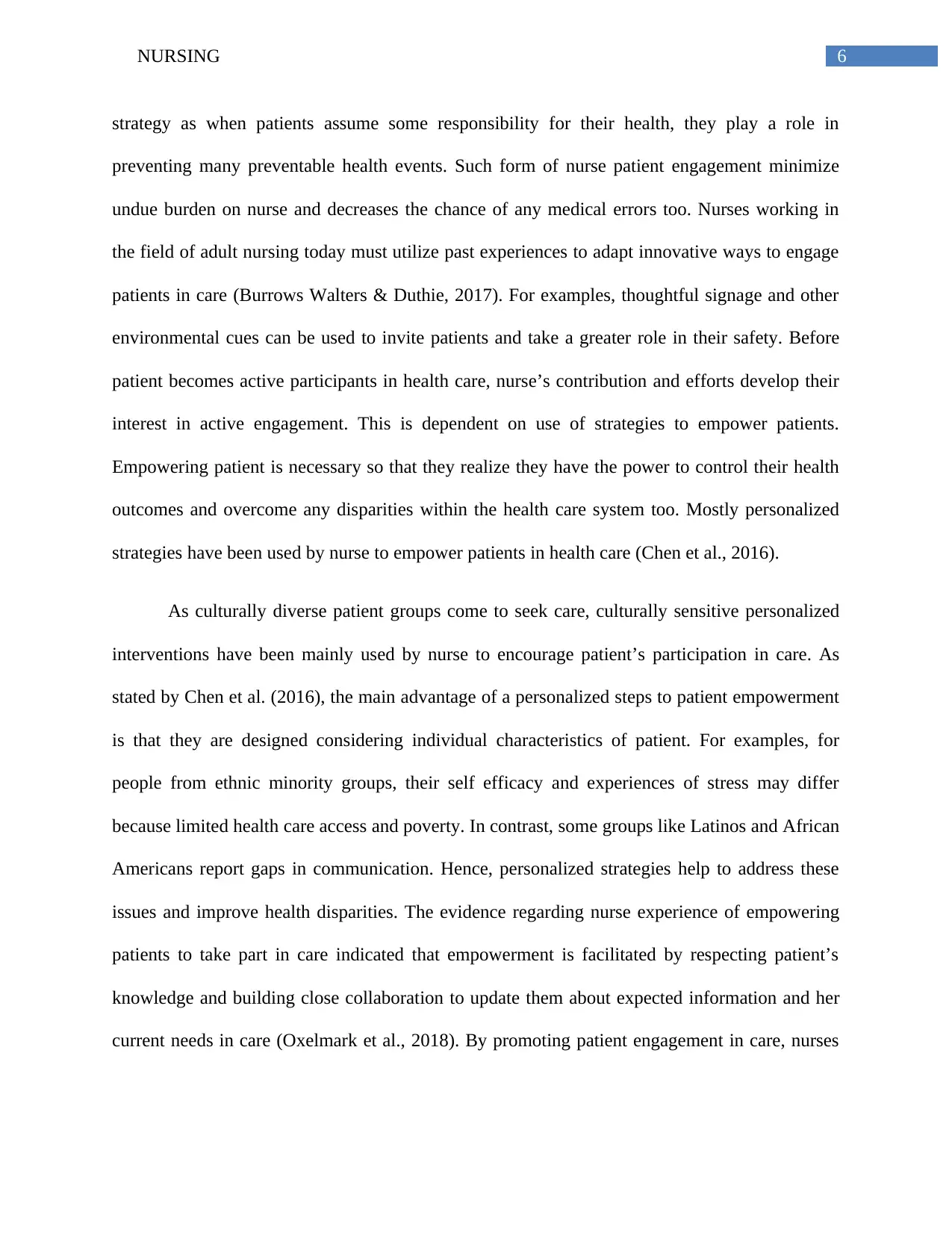
6NURSING
strategy as when patients assume some responsibility for their health, they play a role in
preventing many preventable health events. Such form of nurse patient engagement minimize
undue burden on nurse and decreases the chance of any medical errors too. Nurses working in
the field of adult nursing today must utilize past experiences to adapt innovative ways to engage
patients in care (Burrows Walters & Duthie, 2017). For examples, thoughtful signage and other
environmental cues can be used to invite patients and take a greater role in their safety. Before
patient becomes active participants in health care, nurse’s contribution and efforts develop their
interest in active engagement. This is dependent on use of strategies to empower patients.
Empowering patient is necessary so that they realize they have the power to control their health
outcomes and overcome any disparities within the health care system too. Mostly personalized
strategies have been used by nurse to empower patients in health care (Chen et al., 2016).
As culturally diverse patient groups come to seek care, culturally sensitive personalized
interventions have been mainly used by nurse to encourage patient’s participation in care. As
stated by Chen et al. (2016), the main advantage of a personalized steps to patient empowerment
is that they are designed considering individual characteristics of patient. For examples, for
people from ethnic minority groups, their self efficacy and experiences of stress may differ
because limited health care access and poverty. In contrast, some groups like Latinos and African
Americans report gaps in communication. Hence, personalized strategies help to address these
issues and improve health disparities. The evidence regarding nurse experience of empowering
patients to take part in care indicated that empowerment is facilitated by respecting patient’s
knowledge and building close collaboration to update them about expected information and her
current needs in care (Oxelmark et al., 2018). By promoting patient engagement in care, nurses
strategy as when patients assume some responsibility for their health, they play a role in
preventing many preventable health events. Such form of nurse patient engagement minimize
undue burden on nurse and decreases the chance of any medical errors too. Nurses working in
the field of adult nursing today must utilize past experiences to adapt innovative ways to engage
patients in care (Burrows Walters & Duthie, 2017). For examples, thoughtful signage and other
environmental cues can be used to invite patients and take a greater role in their safety. Before
patient becomes active participants in health care, nurse’s contribution and efforts develop their
interest in active engagement. This is dependent on use of strategies to empower patients.
Empowering patient is necessary so that they realize they have the power to control their health
outcomes and overcome any disparities within the health care system too. Mostly personalized
strategies have been used by nurse to empower patients in health care (Chen et al., 2016).
As culturally diverse patient groups come to seek care, culturally sensitive personalized
interventions have been mainly used by nurse to encourage patient’s participation in care. As
stated by Chen et al. (2016), the main advantage of a personalized steps to patient empowerment
is that they are designed considering individual characteristics of patient. For examples, for
people from ethnic minority groups, their self efficacy and experiences of stress may differ
because limited health care access and poverty. In contrast, some groups like Latinos and African
Americans report gaps in communication. Hence, personalized strategies help to address these
issues and improve health disparities. The evidence regarding nurse experience of empowering
patients to take part in care indicated that empowerment is facilitated by respecting patient’s
knowledge and building close collaboration to update them about expected information and her
current needs in care (Oxelmark et al., 2018). By promoting patient engagement in care, nurses
Paraphrase This Document
Need a fresh take? Get an instant paraphrase of this document with our AI Paraphraser
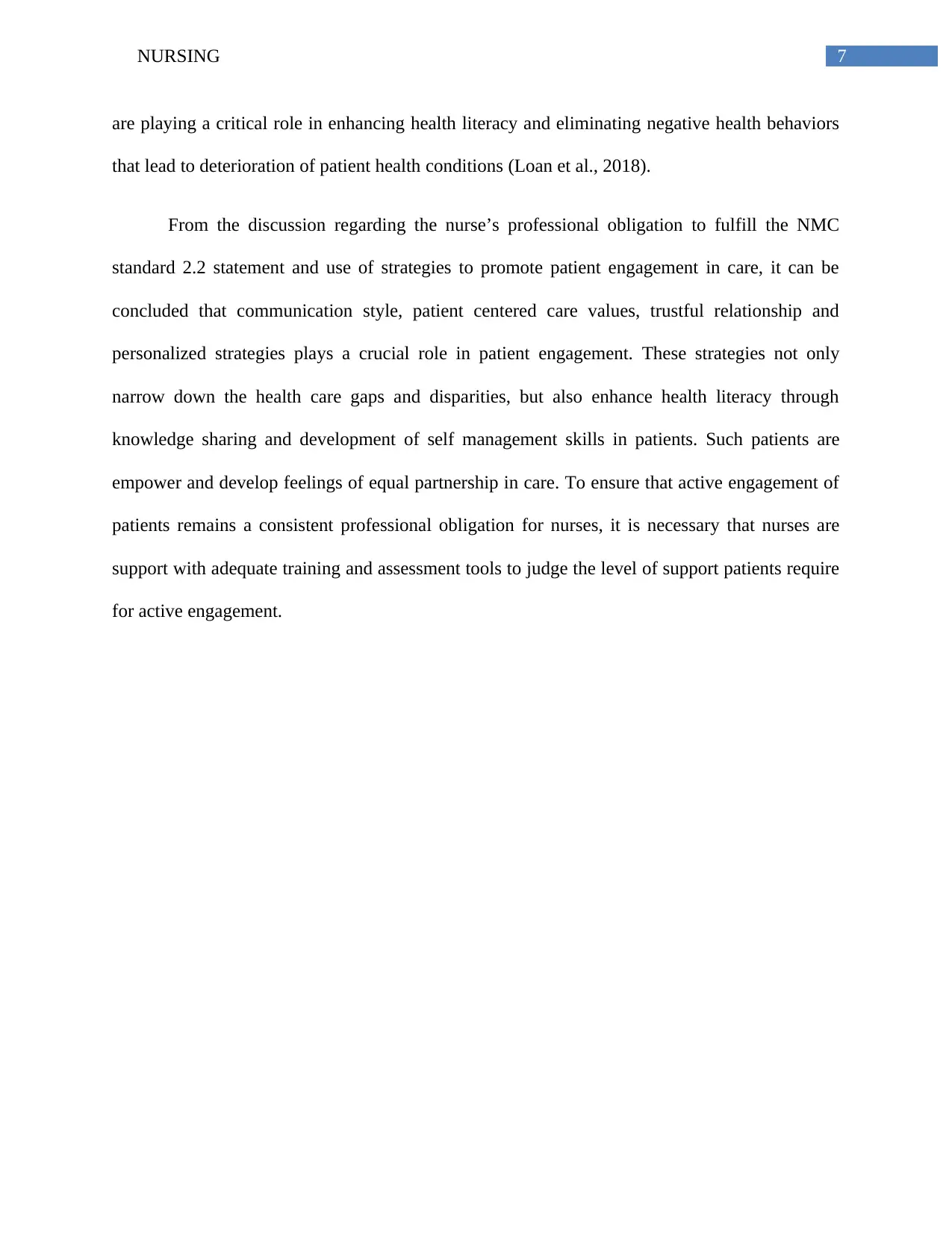
7NURSING
are playing a critical role in enhancing health literacy and eliminating negative health behaviors
that lead to deterioration of patient health conditions (Loan et al., 2018).
From the discussion regarding the nurse’s professional obligation to fulfill the NMC
standard 2.2 statement and use of strategies to promote patient engagement in care, it can be
concluded that communication style, patient centered care values, trustful relationship and
personalized strategies plays a crucial role in patient engagement. These strategies not only
narrow down the health care gaps and disparities, but also enhance health literacy through
knowledge sharing and development of self management skills in patients. Such patients are
empower and develop feelings of equal partnership in care. To ensure that active engagement of
patients remains a consistent professional obligation for nurses, it is necessary that nurses are
support with adequate training and assessment tools to judge the level of support patients require
for active engagement.
are playing a critical role in enhancing health literacy and eliminating negative health behaviors
that lead to deterioration of patient health conditions (Loan et al., 2018).
From the discussion regarding the nurse’s professional obligation to fulfill the NMC
standard 2.2 statement and use of strategies to promote patient engagement in care, it can be
concluded that communication style, patient centered care values, trustful relationship and
personalized strategies plays a crucial role in patient engagement. These strategies not only
narrow down the health care gaps and disparities, but also enhance health literacy through
knowledge sharing and development of self management skills in patients. Such patients are
empower and develop feelings of equal partnership in care. To ensure that active engagement of
patients remains a consistent professional obligation for nurses, it is necessary that nurses are
support with adequate training and assessment tools to judge the level of support patients require
for active engagement.
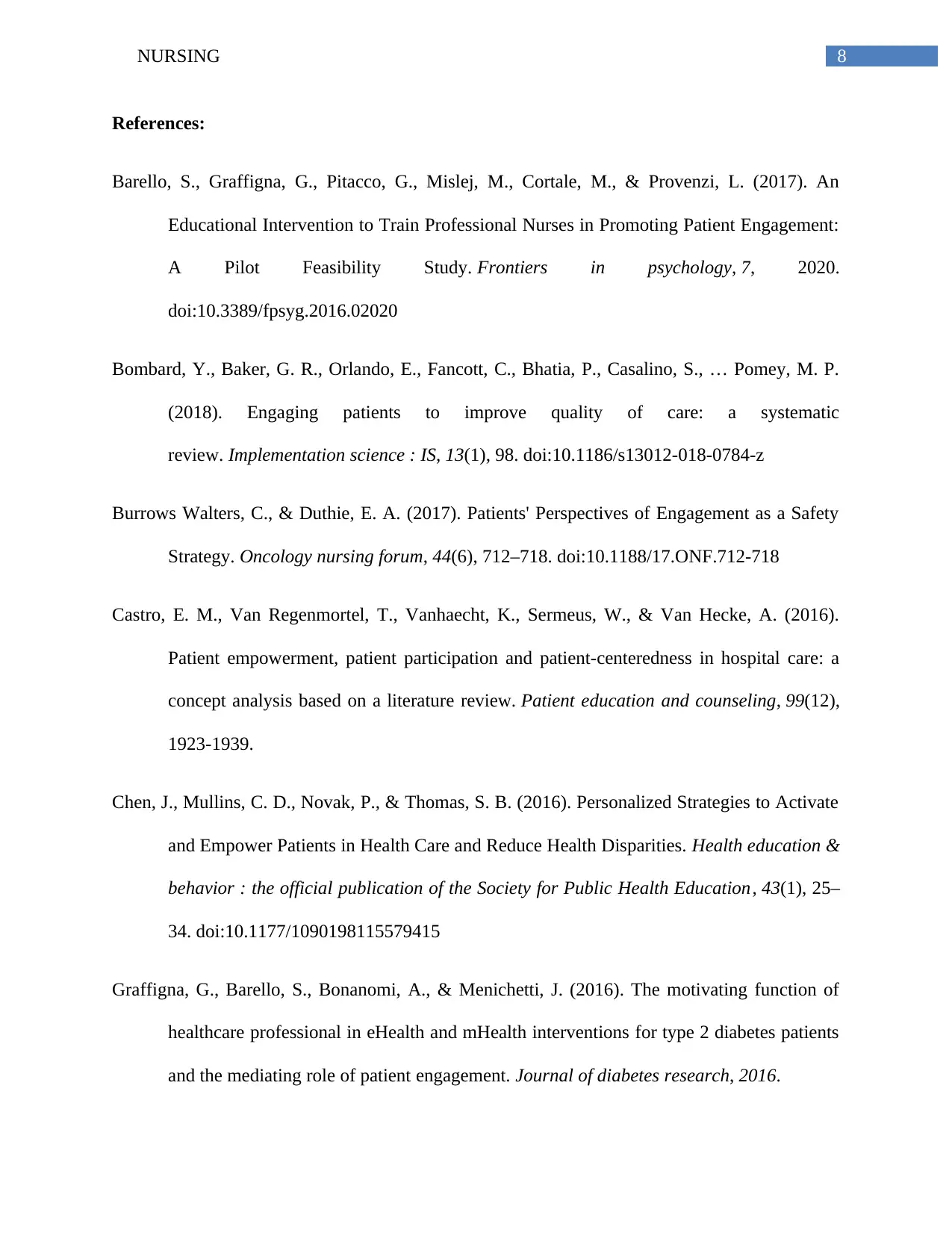
8NURSING
References:
Barello, S., Graffigna, G., Pitacco, G., Mislej, M., Cortale, M., & Provenzi, L. (2017). An
Educational Intervention to Train Professional Nurses in Promoting Patient Engagement:
A Pilot Feasibility Study. Frontiers in psychology, 7, 2020.
doi:10.3389/fpsyg.2016.02020
Bombard, Y., Baker, G. R., Orlando, E., Fancott, C., Bhatia, P., Casalino, S., … Pomey, M. P.
(2018). Engaging patients to improve quality of care: a systematic
review. Implementation science : IS, 13(1), 98. doi:10.1186/s13012-018-0784-z
Burrows Walters, C., & Duthie, E. A. (2017). Patients' Perspectives of Engagement as a Safety
Strategy. Oncology nursing forum, 44(6), 712–718. doi:10.1188/17.ONF.712-718
Castro, E. M., Van Regenmortel, T., Vanhaecht, K., Sermeus, W., & Van Hecke, A. (2016).
Patient empowerment, patient participation and patient-centeredness in hospital care: a
concept analysis based on a literature review. Patient education and counseling, 99(12),
1923-1939.
Chen, J., Mullins, C. D., Novak, P., & Thomas, S. B. (2016). Personalized Strategies to Activate
and Empower Patients in Health Care and Reduce Health Disparities. Health education &
behavior : the official publication of the Society for Public Health Education, 43(1), 25–
34. doi:10.1177/1090198115579415
Graffigna, G., Barello, S., Bonanomi, A., & Menichetti, J. (2016). The motivating function of
healthcare professional in eHealth and mHealth interventions for type 2 diabetes patients
and the mediating role of patient engagement. Journal of diabetes research, 2016.
References:
Barello, S., Graffigna, G., Pitacco, G., Mislej, M., Cortale, M., & Provenzi, L. (2017). An
Educational Intervention to Train Professional Nurses in Promoting Patient Engagement:
A Pilot Feasibility Study. Frontiers in psychology, 7, 2020.
doi:10.3389/fpsyg.2016.02020
Bombard, Y., Baker, G. R., Orlando, E., Fancott, C., Bhatia, P., Casalino, S., … Pomey, M. P.
(2018). Engaging patients to improve quality of care: a systematic
review. Implementation science : IS, 13(1), 98. doi:10.1186/s13012-018-0784-z
Burrows Walters, C., & Duthie, E. A. (2017). Patients' Perspectives of Engagement as a Safety
Strategy. Oncology nursing forum, 44(6), 712–718. doi:10.1188/17.ONF.712-718
Castro, E. M., Van Regenmortel, T., Vanhaecht, K., Sermeus, W., & Van Hecke, A. (2016).
Patient empowerment, patient participation and patient-centeredness in hospital care: a
concept analysis based on a literature review. Patient education and counseling, 99(12),
1923-1939.
Chen, J., Mullins, C. D., Novak, P., & Thomas, S. B. (2016). Personalized Strategies to Activate
and Empower Patients in Health Care and Reduce Health Disparities. Health education &
behavior : the official publication of the Society for Public Health Education, 43(1), 25–
34. doi:10.1177/1090198115579415
Graffigna, G., Barello, S., Bonanomi, A., & Menichetti, J. (2016). The motivating function of
healthcare professional in eHealth and mHealth interventions for type 2 diabetes patients
and the mediating role of patient engagement. Journal of diabetes research, 2016.
⊘ This is a preview!⊘
Do you want full access?
Subscribe today to unlock all pages.

Trusted by 1+ million students worldwide
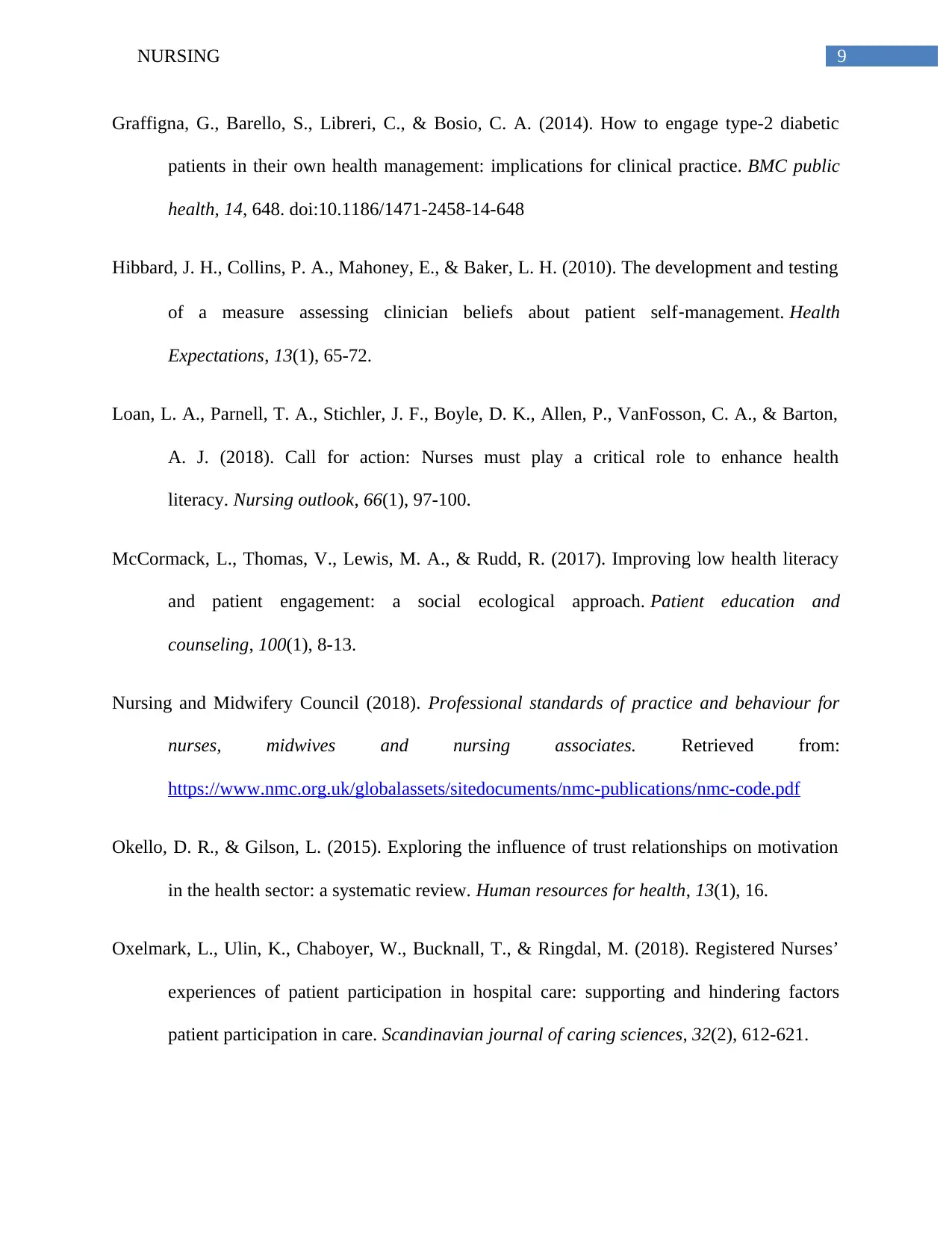
9NURSING
Graffigna, G., Barello, S., Libreri, C., & Bosio, C. A. (2014). How to engage type-2 diabetic
patients in their own health management: implications for clinical practice. BMC public
health, 14, 648. doi:10.1186/1471-2458-14-648
Hibbard, J. H., Collins, P. A., Mahoney, E., & Baker, L. H. (2010). The development and testing
of a measure assessing clinician beliefs about patient self‐management. Health
Expectations, 13(1), 65-72.
Loan, L. A., Parnell, T. A., Stichler, J. F., Boyle, D. K., Allen, P., VanFosson, C. A., & Barton,
A. J. (2018). Call for action: Nurses must play a critical role to enhance health
literacy. Nursing outlook, 66(1), 97-100.
McCormack, L., Thomas, V., Lewis, M. A., & Rudd, R. (2017). Improving low health literacy
and patient engagement: a social ecological approach. Patient education and
counseling, 100(1), 8-13.
Nursing and Midwifery Council (2018). Professional standards of practice and behaviour for
nurses, midwives and nursing associates. Retrieved from:
https://www.nmc.org.uk/globalassets/sitedocuments/nmc-publications/nmc-code.pdf
Okello, D. R., & Gilson, L. (2015). Exploring the influence of trust relationships on motivation
in the health sector: a systematic review. Human resources for health, 13(1), 16.
Oxelmark, L., Ulin, K., Chaboyer, W., Bucknall, T., & Ringdal, M. (2018). Registered Nurses’
experiences of patient participation in hospital care: supporting and hindering factors
patient participation in care. Scandinavian journal of caring sciences, 32(2), 612-621.
Graffigna, G., Barello, S., Libreri, C., & Bosio, C. A. (2014). How to engage type-2 diabetic
patients in their own health management: implications for clinical practice. BMC public
health, 14, 648. doi:10.1186/1471-2458-14-648
Hibbard, J. H., Collins, P. A., Mahoney, E., & Baker, L. H. (2010). The development and testing
of a measure assessing clinician beliefs about patient self‐management. Health
Expectations, 13(1), 65-72.
Loan, L. A., Parnell, T. A., Stichler, J. F., Boyle, D. K., Allen, P., VanFosson, C. A., & Barton,
A. J. (2018). Call for action: Nurses must play a critical role to enhance health
literacy. Nursing outlook, 66(1), 97-100.
McCormack, L., Thomas, V., Lewis, M. A., & Rudd, R. (2017). Improving low health literacy
and patient engagement: a social ecological approach. Patient education and
counseling, 100(1), 8-13.
Nursing and Midwifery Council (2018). Professional standards of practice and behaviour for
nurses, midwives and nursing associates. Retrieved from:
https://www.nmc.org.uk/globalassets/sitedocuments/nmc-publications/nmc-code.pdf
Okello, D. R., & Gilson, L. (2015). Exploring the influence of trust relationships on motivation
in the health sector: a systematic review. Human resources for health, 13(1), 16.
Oxelmark, L., Ulin, K., Chaboyer, W., Bucknall, T., & Ringdal, M. (2018). Registered Nurses’
experiences of patient participation in hospital care: supporting and hindering factors
patient participation in care. Scandinavian journal of caring sciences, 32(2), 612-621.
Paraphrase This Document
Need a fresh take? Get an instant paraphrase of this document with our AI Paraphraser
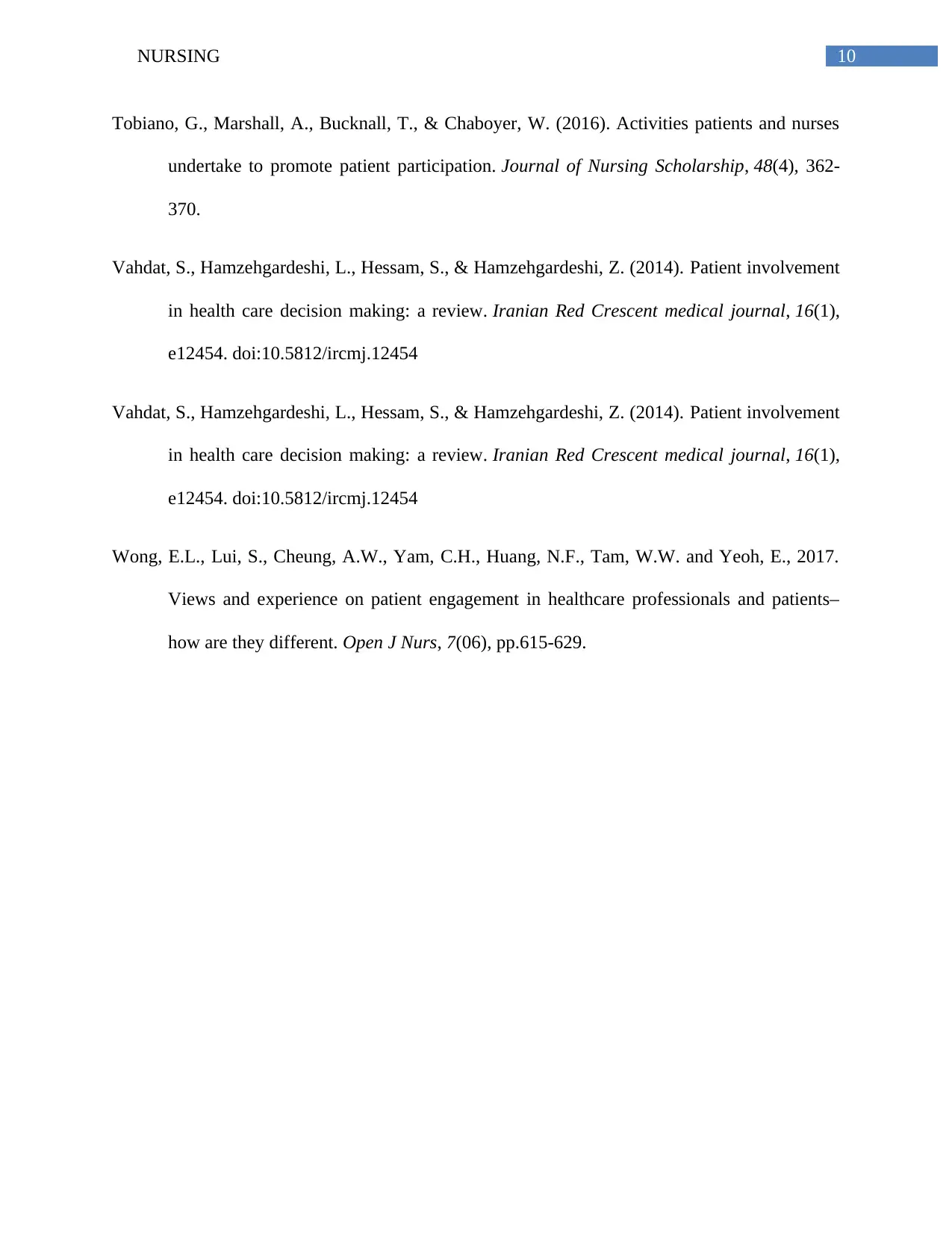
10NURSING
Tobiano, G., Marshall, A., Bucknall, T., & Chaboyer, W. (2016). Activities patients and nurses
undertake to promote patient participation. Journal of Nursing Scholarship, 48(4), 362-
370.
Vahdat, S., Hamzehgardeshi, L., Hessam, S., & Hamzehgardeshi, Z. (2014). Patient involvement
in health care decision making: a review. Iranian Red Crescent medical journal, 16(1),
e12454. doi:10.5812/ircmj.12454
Vahdat, S., Hamzehgardeshi, L., Hessam, S., & Hamzehgardeshi, Z. (2014). Patient involvement
in health care decision making: a review. Iranian Red Crescent medical journal, 16(1),
e12454. doi:10.5812/ircmj.12454
Wong, E.L., Lui, S., Cheung, A.W., Yam, C.H., Huang, N.F., Tam, W.W. and Yeoh, E., 2017.
Views and experience on patient engagement in healthcare professionals and patients–
how are they different. Open J Nurs, 7(06), pp.615-629.
Tobiano, G., Marshall, A., Bucknall, T., & Chaboyer, W. (2016). Activities patients and nurses
undertake to promote patient participation. Journal of Nursing Scholarship, 48(4), 362-
370.
Vahdat, S., Hamzehgardeshi, L., Hessam, S., & Hamzehgardeshi, Z. (2014). Patient involvement
in health care decision making: a review. Iranian Red Crescent medical journal, 16(1),
e12454. doi:10.5812/ircmj.12454
Vahdat, S., Hamzehgardeshi, L., Hessam, S., & Hamzehgardeshi, Z. (2014). Patient involvement
in health care decision making: a review. Iranian Red Crescent medical journal, 16(1),
e12454. doi:10.5812/ircmj.12454
Wong, E.L., Lui, S., Cheung, A.W., Yam, C.H., Huang, N.F., Tam, W.W. and Yeoh, E., 2017.
Views and experience on patient engagement in healthcare professionals and patients–
how are they different. Open J Nurs, 7(06), pp.615-629.
1 out of 11
Related Documents
Your All-in-One AI-Powered Toolkit for Academic Success.
+13062052269
info@desklib.com
Available 24*7 on WhatsApp / Email
![[object Object]](/_next/static/media/star-bottom.7253800d.svg)
Unlock your academic potential
Copyright © 2020–2026 A2Z Services. All Rights Reserved. Developed and managed by ZUCOL.




